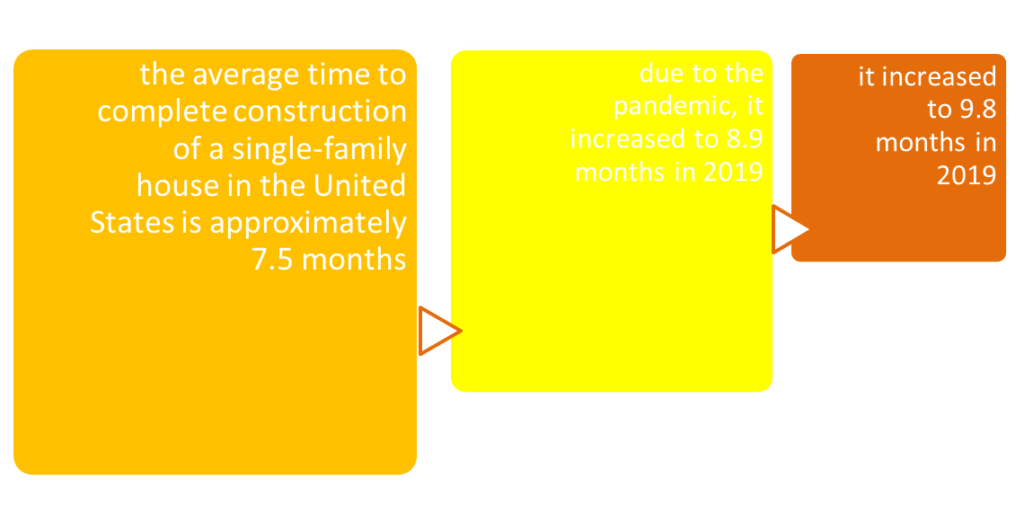
The best way to save money when building a house is to make a clear savings plan and stick to it. The plan should implement these 9 steps:
- Create a contractors database!
- Start building a relationship with the contractor as soon as possible!
- Arrange flexible construction time!
- Arrange construction in stages!
- Go into details!
- Punish mistakes and delays!
- Ask for extras!
- Charge for advertising!
- Negotiate an alternative payment!
The right time to put together such a plan is parallel to designing a house, and the right time to start working on implementing savings is right after! This is important to remember because if you do not start dealing with this in time, you will not be able to apply many of the possibilities that we will present to you.
The goal we need to set ourselves is to achieve as much money savings as possible by investing our own effort and time but not compromising quality.
Although it is far simpler and easier to contract building of a house with one contractor and oblige him to deal with the procurement of materials, this is also a far more expensive option. The first step in compiling a savings plan is to separate material procurement processes and contractor engagement. Then follow the guide we bring you below, consistently!

The ultimate, step-by-step, guide to saving when hiring a contractor!
We have to mention some important things at the very beginning. First, this guide, certainly, presumes the use of general negotiation techniques, which we will list in the appendix at the end of the text. And secondly, this is not about using any tricks or gimmicks (not to mention scams), but about regularly applied arrangements that bring benefits to both stakeholders, the builder and the investor.
9 ways to save when hiring a contractor!
The steps that follow are listed in order of priority! Follow them one by one, carefully, and you will be surprised how much money you can save.
1. Create a contractors database!
This is an absolute priority at the outset! Nowadays it is completely unquestionable that IT speeds up, facilitates and makes every business more successful. It is not necessary to buy expensive software, it is enough to make a quality and as comprehensive table as possible in EXCEL.
Inside, you will first enter basic information about contractors in your area such as basic construction price, possible construction start date, estimated construction duration and so on.
In addition to this basic information, you need to collect and record in this table a few pieces of data that are of the utmost importance for the correct selection of contractor. Ask contractors for information on previously completed projects. A quality portfolio is the greatest guarantee of future successful cooperation. Then contact their previous clients and try to find out their experiences, both positive and negative. And last but not least, find out what the financial situation of potential contractors is. The last thing you need is a suspension of work due to the financial blockade of the contractors.
Create this database as soon as possible and fill it in as much detail as possible!
2. Start building a relationship with the contractor as soon as possible!
Even though you are paying your contractors to work, you should put some time in to make their job as easy as possible. Instead of having the attitude that you are paying good money and you can find someone else to do the job, you should take the approach that you want to work with one particular contractor because you share the same vision, the same values. You need to take the time and share that vision of yours because you’re building a home and not just a house.
If you start on time, while you are still in the design phase, you can make suppliers compete with each other. After you determine which contractor is the most favorable, go to a few more and bring them the best deal you’ve found. Then ask them to give you a better deal!
As well as when you buy the material, by paying in advance, long before the start of construction, you can get a significant discount.
3. Arrange flexible construction time!
With the exception of professional builders, people, most often, build a house only once in a lifetime. When this process begins, their greatest wish is to finish as soon as possible. Although this attitude is quite understandable, it is in the time frame that the potential for great savings lies.
Contractors strive to realize as many projects as possible during the construction season. For many reasons, there are several days or even weeks without work between the two projects, just as there may be a setback during the construction that began. This waste of time is a pure financial loss for the contractor, because there is no profit, and all fixed costs are accumulating. This is an opportunity for you! If you are willing to show more patience, offer the contractor to build for you during these time periods. Of course, the project that requires several weeks of effective work will last for several months, but the price of the work will be incomparably lower.
Another thing you can do, with the same idea, is to contract building out of season, in the winter time.
One of my coworkers negotiated the construction of a family house, which should have taken less than two months to finish, so the construction took a year. The craftsmen were only active during short breaks in the construction of other projects, which benefited the subcontractor because it would have been wasted time otherwise. The final cost was twice lower than usual.

4. Arrange construction in stages!
If you are willing to sacrifice some time and nerves, you can save significantly by taking on the role of main contractor and then hiring subcontractors. For this purpose it is necessary to divide the whole project of building a house into phases.
Analyze each phase individually and decide if there is something you can do on your own with your friends.
Contract each phase separately, asking for the best price! You will be completely surprised by the difference in the final price compared to the price that one contractor would ask for the whole project.
5. Go into details!
When contracting works, it is necessary to delve as much as possible and define even the smallest details. By putting every little thing into the contract we achieve two things which bring savings. First, we avoid contract annexes for works that are not specified and the contractor does not think they are implied. And second, we avoid disturbing good relations with each other and accelerating work.
6. Punish mistakes and delays!
When contracting, you must define penalties for each day of delay and for each error in the execution of works. Of course you need to be flexible and tolerate some little things that can happen for objective reasons, but by defining the penalties the contractors should be motivated to be precise and accurate.
7. Ask for extras!
Whenever you negotiate, and especially when the contractor is not ready to significantly reduce the price, you ask him to give you something more in return. It can be the construction of a driveway, a fence, a shed, a dog house…
8. Charge for advertising!
Most building sites need at least a 2 meter (6.5 feet) high fence or hoard with 2.4 meters (7.8 feet) being the recommendation. High-security fences or hoarding is 3 meters (9.8 feet). For sites in city centers, or places where children may attempt to gain access, a higher fence may be appropriate. On these hoards, on the outside, i.e. towards the street, the contractors usually put up their banners. Since this is your construction site, you should consider charging for an advertising service. And if you’re a little enthusiastic you might be able to find other companies interested in this ad space.
9. Negotiate an alternative payment!
It should never be forgotten that contractors also need all kinds of services and goods. Maybe you can provide some of that or you know someone (friend, relative, neighbor…) who can do it, and he owes you a favor…??? In any case, it is worth trying to make such a non-monetary arrangement and save over the much needed cash.
BONUS: General rules of negotiation
- clarify everything that is not clear to you
- create win-win outcomes
- define the minimum level of acceptability
- aim high and have an optimistic approach
- develop realistic alternatives
- know when to give up
- be fair
- keep in mind the goals of the other party and meet them
In conclusion, building a house is a significant investment that requires careful planning and budgeting. By creating a clear savings plan and implementing the 9 steps outlined in this guide, you can save a significant amount of money while ensuring the quality of your home. It is essential to start early, build a relationship with your contractor, and be willing to put in the effort to manage the project and negotiate deals. Remember to prioritize each step in order and remain flexible to take advantage of opportunities for savings. By following these guidelines, you can achieve your goal of building a quality home while staying within your budget.
